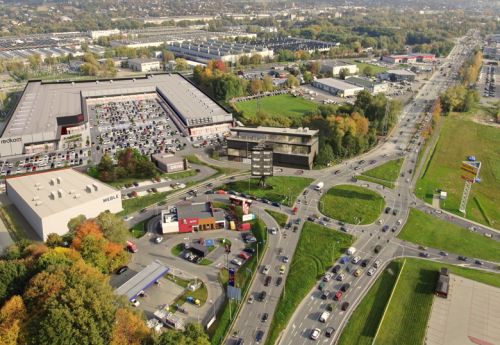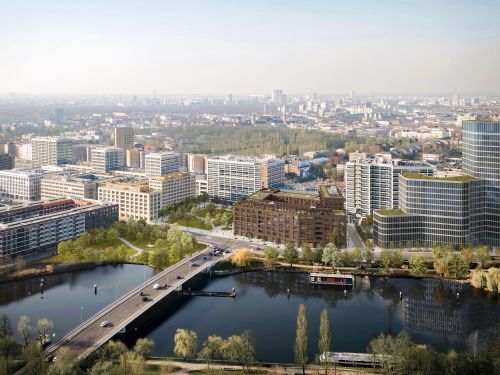Come on, Skra!
Law
The Global Partners Investment Fund recently came to Warsaw to speak about a problem it’s been having. The problem relates to the Skra Stadium in the Polish capital. The Irish development company purchased the right of perpetual usufruct to 12 ha of land around the stadium located at the junction of ul. Wawelska and ul. Żwirki i Wigury in 2006, but which was due to expire in 2014. GPIF did not think there was a risk that the right would not be extended, relying on the advice of two respected Polish law firms, who were more than certain that this was the case. However, the city did not agree to extend the right. GPIF says the city of Warsaw has launched a negative PR campaign against the company in order to get its hands back on the Skra site. Both the city and the investor have complained to ‘Eurobuild CEE’ that the other party is working against the law and the public interest. And in the meantime, the stadium is falling further and further into ruin. The case has now ended up in court, and according to what GPIF told Eurobuild CEE: “GPIF always wanted to work with Skra and has not given up on the project,” adding that the company does not see any possibility of exiting the project and writing off the millions it has invested in Skra. “We have already spent EUR 20 mln on the project,” says Michael Holland, who represents the investor.
The history of the game
The stadium was originally opened in 1953. In 1974 (the start of the perpetual usufruct in communist Poland), Worker’s Sports Club RKS Skra was given the perpetual usufruct of the plot for the next 40 years. The sports club itself is now owned by its members and is independent from the city. In 2006, it sold its perpetual usufruct rights to 60 pct of the site to Irish developer GPIF. According to the law, the city (even as the owner of the plot) does not have to approve the sale or purchase of such a right. The company had come up with a plan to develop the ‘Park of Lights’ project on the premises. As GPIF has highlighted, this was the initial project. “Anyway, we could not do anything without the city,” Michael Holland tells us. The design for the mixed-use project, which was drawn up by Kuryłowicz & Associates, envisioned green areas and pedestrian alleys over 60 pct of the surface of the area, 20 pct would be designed for recreation and sports facilities and around 10 pct would have commercial buildings. The project included the construction of an athletics stadium, an aqua park, a race track and a museum. This was 2008, six years before the expiration of the perpetual usufruct. In February they applied for the perpetual usufruct prolongation.
Park with no light
According to Global Partners, the city did not allow any work to be done on the site, saying that it was not covered by a zoning plan. And according to the GPIF representative, the investor submitted several proposals for a zoning plan to the city. The city’s spokesman, Bartosz Milczarczyk, claims that a zoning plan was issued in on June 18th, 2009, to allow sporting facilities and the development of greenery in this part of the city. The investor’s representative, on the other hand, says that according to the plan, more than 60 pct of Skra was designated for sports infrastructure and the rest was to have consisted of catering facilities, office buildings, hotels and exhibition halls. “The plan also involved giving Skra Stadium the status of a monument, requiring the maintenance of part of its façade in the rebuilt stadium” says Michael Holland of GPIF. “The city has since rejected all the investor’s projects, justifying this with the lack of a zoning plan and at the same time refusing to issue local plans. GPIF had been seeking to carry out, as one of the first projects, the revitalisation of the pools. But the city has not even granted GPIF permission to do that. Global Partners Investment Fund is now being blamed for the ruinous state of the stadium. “The stadium was built in 1953, and since 2006 the investor has tried, in good faith, to maintain it. Meanwhile, the city has launched a negative media campaign,” remarks the representative of GPIF. “They just wanted to stall us,” he added. But the city has countered that the company did not want to renovate anything without permission for other building construction. “The renovation of the sports facilities was dependent on allowing Global Partners Investment Fund to develop residential buildings on half of the plot. However, the zoning plan doesn’t even mention residential buildings. Therefore the Irish investor did not proceed with the renovation work,” argues the city’s representative. GPIF claims that despite many attempts to contact them, Warsaw city representatives have refused to meet with GPIF even once. However, the city has not provided any answer to the question if and why there such a situation has arisen. “In this situation, [with the brand new zoning plan], the investor has prepared another project, in line with the land use plan. The lower-rise project was submitted in 2009. Although the preliminary nature of the concepts was in place, as was the readiness of Skra and GPIF to discuss and modify the project, the city was not interested in cooperation. It has rejected all the investor’s requests for an extension of the perpetual usufruct in 2008 and 2009. And this was surprise for us. The dispute concerning the extension of the perpetual usufruct has made it impossible to invest in the property,” says Michael Holland, adding that the city “has withdrawn from the case while taking steps to recover the property.”
The game moves to court
The city sees the situation in a different way. “Due to the failure of the users to fulfil the conditions of the contract for the perpetual usufruct – the properties are in a poor technical condition and most of the area is neglected – the city contacted Skra and GPIF in a letter dated May 14th 2008 to request the voluntary termination of the perpetual usufruct contract. The users of the plot did not agree to terminate the contract and therefore the City of Warsaw on December 22nd 2008 filed a case to terminate the perpetual usufruct agreement,” explained Bartosz Milczarczyk. Later, in April 2009, the city informed the applicants that due to the pending proceedings for the termination of the perpetual usufruct, the request for its extension could not be accepted. What does the law actually say? According to art. 236 §2 of the Civil Code, refusal to extend the right of perpetual usufruct is possible only in the case of important public interest. And according to GPIF, no such public interest existed in this case. Therefore Skra and GPIF filed a case for an extension of the perpetual usufruct agreement on September 23rd 2009. The investor tells us that the Court of First Instance upheld the position of the club and the investor, committing the city to extend the right of perpetual usufruct by 99 years. The city then lodged an appeal. As a result, the Court of Appeal reversed the judgment and dismissed the case. “The Court of Appeal unreasonably interpreted the case, wrongly assessing the criteria and ignoring the fact that it was the city who refused to cooperate with the users of the right,” says Michael Holland. On the other hand, the city’s spokesman explained to us that “the court said that the state of the property to a large extent is neglected and vandalised.” The dismissal prompted the investor has decided to refer the case to the Supreme Court in June 2014. “The verdict should be delivered in March 2015,” said the representative of GPIF. “It is hard to say whether the Supreme Court will back the decision of the Appeal Court. The city of Warsaw’s representatives have submitted the answer for the cassation complaint to the Supreme Court,” says Bartosz Milczarczyk of Warsaw city council.
Lawyers guilty?
The Irish company had originally come to Poland to buy… an investment plot? Wrong! It had bought the perpetual usufruct right to part of a plot – a plot without any zoning plan – eight years before the right was scheduled to expire. Despite this, investor’s representative nevertheless insists that the company could not have predicted that anything like this could happen. And they did not buy it on some whim due to their different Irish mentality. According to the GPIF representative, the company sought legal advice from two law firms based in Poland, who both said that the company could be sure of getting an extension. “This is unprecedented, that city officials are openly saying: we will take back Skra. The only mistake we have made is the belief that, in accordance with the law in Poland and throughout Europe, if you are buying assets in good faith and take care of them, no one will throw you off your plot,” he concludes.
Sportsmen without land...
So what now for the club? A solution has been mooted by the city. “RKS Skra has already submitted an application for the lease of the plot, but up to this point [Ed: November 2014], it has not provided any details about the plot, nor it has submitted all the necessary documentation,” declares the city’s representative. Bartosz Milczarczyk. In addition to this, he warns that any institution or company that is using the plot under the perpetual usufruct in an improper – according to the city – manner, can expect an application for the termination of the perpetual usufruct contract. The city is remaining silent over whether it wants to invest on the plot on its own, or if another location will be given to the Skra sports club. “The city has still not applied for the return of the property, since the cassation case is still being adjudicated. Due to this fact, it is also impossible to carry out any revitalisation work on the premises,” the city’s representative says.
What now?
The city claims that in the meantime, the club could sign a lease contract with the city, provided that the club meets the requirements of the law as applicable,” says Bartosz Milczarczyk. In addition to this, the city’s representatives are insisting that after the termination of the perpetual usufruct agreement the former user has no rights (including pre-emptive rights). So if the Supreme Court upholds the reversed judgment of the Appeal Court, “the city will be able to sell the plot on the market,” its representative claims. ν






















































